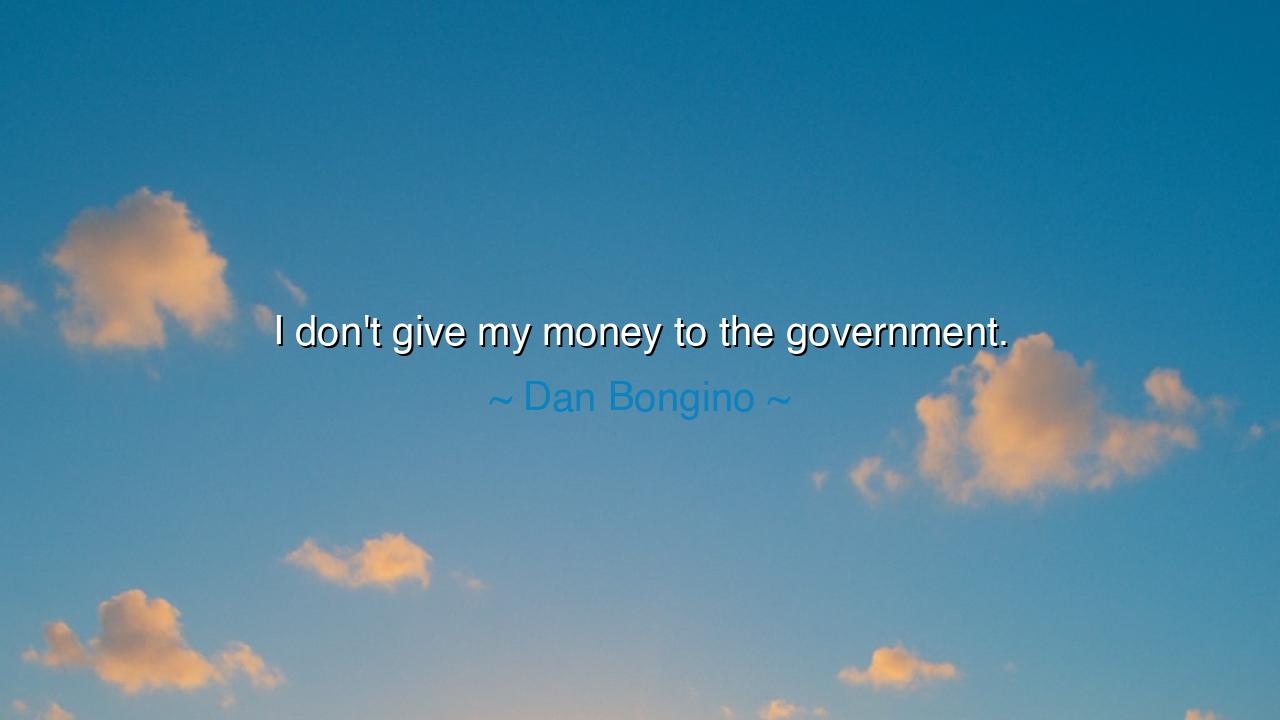
I don't give my money to the government.






In the voice of defiance and conviction, Dan Bongino, a former Secret Service agent and conservative thinker, once declared: “I don’t give my money to the government.” Though brief, these words strike like a hammer upon the anvil of liberty. They are not merely about taxation or wealth—they are a cry for freedom, a protest against the surrender of one’s labor to powers unseen and unaccountable. In that single sentence lives an ancient struggle—the eternal tension between the individual and the state, between the fruits of personal effort and the grasping hand of authority. It is the voice of a man who believes that the sweat of his brow belongs first to his family, his faith, and his conscience, and only lastly, if at all, to the government that claims to serve him.
To understand the meaning of this quote, we must first uncover its spirit. Bongino’s words are not born from greed, but from principle. When he says he does not give his money to the government, he speaks for all who believe that the state exists to serve the people, not to consume them. In a world where governments grow vast, feeding upon taxes and debts, where bureaucracy stretches its fingers into every corner of life, such a statement is a declaration of independence. It is the modern echo of a timeless creed—that what a person earns is a reflection of their toil, their dreams, and their sacrifice. To take it without restraint is to wound the dignity of the free.
The origin of this sentiment runs deep through the soil of human history. From the days of ancient empires, rulers have demanded tribute from their subjects. But in every age, there have also been those who resisted. The cry “no taxation without representation” that sparked the American Revolution was born from this very defiance. The colonists did not reject all contribution—they rejected unjust power, the demand of a distant king who took without consent. In standing against that, they affirmed a sacred truth: that taxation is not a gift from the people to their rulers, but a covenant of trust. Bongino’s words, though uttered centuries later, spring from the same well—the conviction that freedom dies when government forgets its limits.
Consider also the story of Ayn Rand, the philosopher and novelist who fled the oppression of Soviet Russia. In her adopted home of America, she became a voice for the sanctity of the individual and the danger of collectivism. She warned that when government begins to see citizens not as souls but as sources of revenue, liberty begins to crumble. Rand, like Bongino, believed that money is not merely currency—it is a symbol of human energy, of time that can never be regained. To confiscate it without gratitude or accountability is to rob a person twice—once of wealth, and again of purpose.
Yet we must also temper this passion with wisdom. For government, at its best, is not the enemy of the people but the guardian of their common good. Roads, schools, armies, and courts—these require the strength of shared contribution. What Bongino reminds us, however, is that this contribution must be earned, not coerced. A just government asks with humility, not with threat. It spends with wisdom, not with waste. It must remember that every dollar taken was once a heartbeat of human labor, and every tax levied must serve a purpose noble enough to justify that exchange.
In this balance lies the heart of the teaching. Freedom without order descends into chaos; but order without freedom becomes tyranny. Bongino’s cry is a warning against the second danger—a call to vigilance in an age when states grow mighty and individuals grow weary. It is a reminder that the power to tax is also the power to control, and that this power must be bound by moral restraint. For when citizens cease to question how their money is used, they surrender not only their wealth, but their voice.
Therefore, my children of liberty, take this lesson to heart: guard your earnings as you guard your dignity, for both are born of your effort. Pay your dues, yes—but demand that your rulers prove worthy of them. Support what uplifts the many, but resist what feeds the few. Do not give blindly, and do not obey in silence. Let your contribution be an act of conscience, not of fear. For when the people remember that government draws its strength from them—and not the other way around—then liberty is renewed, and the flame of self-determination burns bright once more.
And so, let the words of Dan Bongino be more than defiance—let them be a summons. A call to accountability, to responsibility, to the sacred bond between free people and the state they permit to govern them. For in the end, freedom is not the absence of taxes—it is the presence of choice, of honor, and of vigilance. The wise man does not give his money to the government; he entrusts it—watchfully, conditionally, and with the unyielding demand that it be used to preserve, not diminish, the freedom from which it was born.






AAdministratorAdministrator
Welcome, honored guests. Please leave a comment, we will respond soon